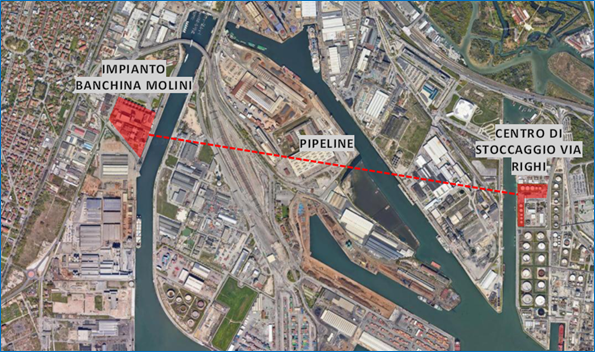Designed to transfer of vegetable oils, the pipeline is included in the Authority’s Three-Year Operational Plan and will directly connect the production plant in Via Banchina Molini (where the product will be unloaded from ships) and the shore-side depot in Via Righi, that also hosts additional storage tanks. The underground pipeline will be 2.6 km long and have an internal diameter of 250 mm.
The project will reduce the CO2 emissions generated by the use of heavy transport vehicles by approximately 27,700 kg/year. Indeed, although it is positioned on the Brentella canal, the depot in via Righi cannot be currently used as a transhipment site as the depth of the canal does not allow the transit of the vessels used to transport vegetable oils. Consequently, the site is currently supplied exclusively by tankers that shuttle daily between the two plants owned by Cereal Docks.
The services conference is also currently underway for the construction of 6 dedicated silos in the Banchina Molini for the so-called preparatory stage where soybeans are conditioned prior to the industrial transformation process. A total of 15 million Euros has been allocated for both projects and the total storage capacity of the two plants, once connected, will reach a total of 130,000 Tm.
‘These actions,’ explains AdSPMAS President Fulvio Lino Di Blasio, ’was a necessary step to boost the operations and competitiveness of a company that is a key player in our port, that has always been a reference point for agro-food traffic, also due to its large industrial hinterland and efficient intermodal connections. The milling, animal feed and oilseed crushing industries have a major role in our cargo mix, allowing us to establish ourselves nationally as one of the main multipurpose ports.’.
Cereal Docks Marghera is the main agribulk operator in the Port of Venice: its production plant was taken over in 2011 by the multinational Bunge and was subsequently revamped through investments worth 100 million Euros with the aim of doubling its production capacity. It is designed to receive and process soyabeans from different areas of the world. Cereal Docks also owns the shore-side depot in Via Righi in Marghera for the storage of oils. The Marghera plant (employing 35 staff) operates in synergy with the other facilities of the Cereal Docks Group and has a storage capacity of 80 thousand tonnes of produce that serve an oil, flour and lecithin extraction plant, with a potential capacity of about 1 million tonnes/year of processed seed. Cereal Docks Marghera’s products are used in the food and animal feed sectors. To guarantee efficiency and provide ongoing supplies to the market, the plant is equipped with an unloading quay for transoceanic ships and a logistics platform integrating ship, rail and road.
‘We are satisfied with the news that permissions have been granted,’ says Paolo Fanin, managing director of Cereal Docks Marghera, ’and are pleased that it was a swift process. The pipeline and the new storage silos projects, confirm that Cereal Docks believes in the strategic importance of the port of Venice’.
‘The pipeline connecting the Banchina Molini plant with the shore-side vegetable oil depot in Via Righi,’ says the Plant Manager Roberto Olivo, ’is an ambitious and rather unique project at a European level. Its positive outcomes will be seen also in terms of environmental sustainability as we will be able to streamline logistics flows, thus improving our service to customers, that are major domestic food industries representing the most important sector in our manufacturing industry, with a turnover of 179 billion Euros, 64 of which are allocated to exports.


